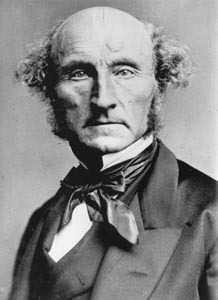The quest for the universal morality : manifested dogmas or natural impulse?
“…It is better to be a human dissatisfied than a pig satisfied; better to be Socrates dissatisfied than a fool satisfied….”
John Stuart Mill / British Philosopher and Political Economist

still : John Stuart Mill, a highly influential Philosopher and Political Economist from 19th century
Throughout centuries, philosophers and intellectuals have always been in the quest of seeking for the most rightful and valid conception of morality that is universally reasonable. The true core of morality that has a capability to render humanization against the arbitrary, savage and despotic state apparatus and absolute authority. After the industrial revolution and the abolition of monarchy that sweeps through europe, and followed by a colossal annihilation of million civilians and resources during world wars, it brought out the awareness of natural rights which are safeguarded and preserved under a virtual imposition of international laws. But, does it have a competence to turn human intution to become more ethical and moral?
Moral principles are legitimized per se by nature. Human generally have it’s own faculty to judge what is wrong or right. We certainly don’t need UN or International Tribunal to perceive war as an extreme violence, the ugliest thing that have ever attacked humanity. No need any label to render human morality to function and play it’s role in society. Without the existence of foundation and recognition is what therefore enables it’s charitable force and natural altruism, even it can effectively root out the most sinister traits, including those which originates out of power system, ranges from pseudo-democracy to genocidal and racist doctrines.
So, what is the ground to achieve the ultimate and greatest happiness by nature? how to set off the moral principle of right or wrong to function? According to Jeremy Bentham : the most fundamental keys are to maximise pleasure and reduce pain, as both are the most authoritative law of nature and ruling governance of individuals. So by all means, the final end for moral values lies ultimately in our pursuit for pleasures.
But how about if the happiness was conditioned to become universal values? can we reconcile ego with common interest? John Stuart Mill carried on by creating a philosophy of a moral-based pleasure that is situationed to not just satisfy one individual but also others. As he had expressed in his remark : for cultivating humanity and morality, it would be preferable for a strike against a clever man rather than cater one idiot. Because the goal of utility principle is not designed to gratify a thousand swines whom people despise for their lack of intelligence and incapability to struggle, but to aim intelligent beings who are critical, skeptical and able to bravely challenge the despotic ruler to flourish.
Written by DHANA
2 responses to “The quest for the universal morality : manifested dogmas or natural impulse?”
Trackbacks / Pingbacks
- - August 3, 2013
Great and interesting essay! Thanks for the link 🙂